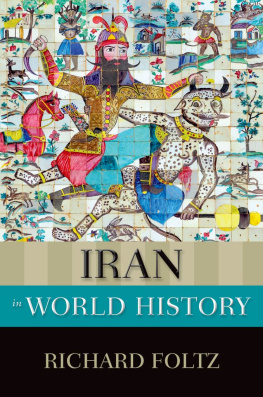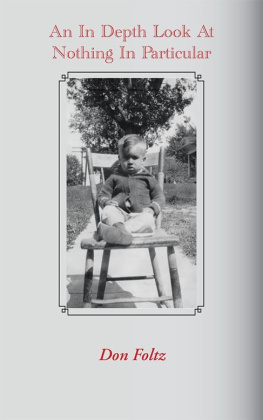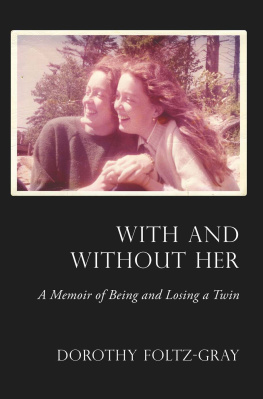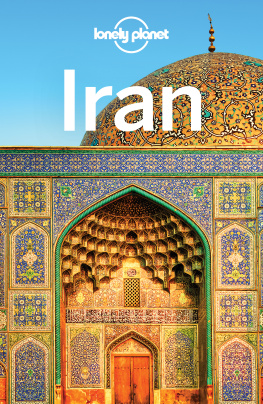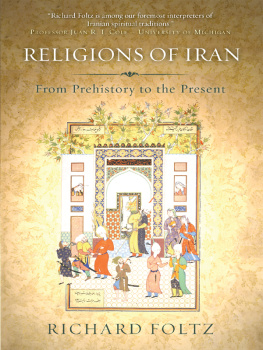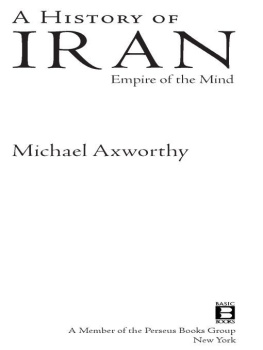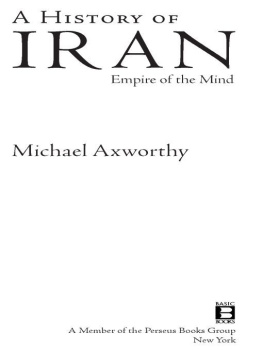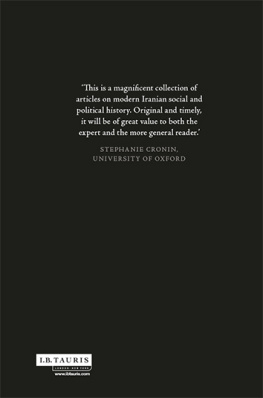Foltz Richard - Iran in World History
Here you can read online Foltz Richard - Iran in World History full text of the book (entire story) in english for free. Download pdf and epub, get meaning, cover and reviews about this ebook. year: 2015, publisher: Oxford University Press, Incorporated, genre: Religion. Description of the work, (preface) as well as reviews are available. Best literature library LitArk.com created for fans of good reading and offers a wide selection of genres:
Romance novel
Science fiction
Adventure
Detective
Science
History
Home and family
Prose
Art
Politics
Computer
Non-fiction
Religion
Business
Children
Humor
Choose a favorite category and find really read worthwhile books. Enjoy immersion in the world of imagination, feel the emotions of the characters or learn something new for yourself, make an fascinating discovery.
- Book:Iran in World History
- Author:
- Publisher:Oxford University Press, Incorporated
- Genre:
- Year:2015
- Rating:5 / 5
- Favourites:Add to favourites
- Your mark:
- 100
- 1
- 2
- 3
- 4
- 5
Iran in World History: summary, description and annotation
We offer to read an annotation, description, summary or preface (depends on what the author of the book "Iran in World History" wrote himself). If you haven't found the necessary information about the book — write in the comments, we will try to find it.
Iran in World History — read online for free the complete book (whole text) full work
Below is the text of the book, divided by pages. System saving the place of the last page read, allows you to conveniently read the book "Iran in World History" online for free, without having to search again every time where you left off. Put a bookmark, and you can go to the page where you finished reading at any time.
Font size:
Interval:
Bookmark:

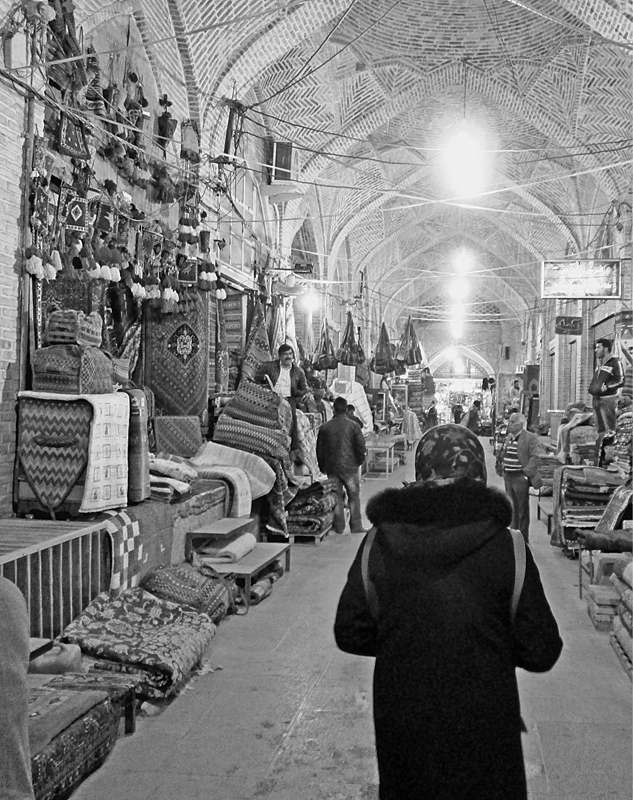
Frontispiece:Vakil bazaar, Shiraz. Photo by author

Oxford University Press is a department of the University of Oxford. It furthers the Universitys objective of excellence in research, scholarship, and education by publishing worldwide.
OxfordNew York
AucklandCape TownDar es SalaamHong KongKarachi
Kuala LumpurMadridMelbourneMexico CityNairobi
New DelhiShanghaiTaipeiToronto
With offices in
ArgentinaAustriaBrazilChileCzech RepublicFranceGreece
GuatemalaHungaryItalyJapanPolandPortugalSingapore
South KoreaSwitzerlandThailandTurkeyUkraineVietnam
Oxford is a registered trademark of Oxford University Press in the UK and certain other countries.
Published in the United States of America by
Oxford University Press
198 Madison Avenue, New York, NY 10016
Oxford University Press 2016
All rights reserved. No part of this publication may be reproduced, stored in a retrieval system, or transmitted, in any form or by any means, without the prior permission in writing of Oxford University Press, or as expressly permitted by law, by license, or under terms agreed with the appropriate reproduction rights organization. Inquiries concerning reproduction outside the scope of the above should be sent to the Rights Department, Oxford University Press, at the address above.
You must not circulate this work in any other form and you must impose this same condition on any acquirer.
Library of Congress Cataloging-in-Publication Data
Foltz, Richard, 1961Iran in world history / Richard Foltz.
pages cm. (New Oxford world history)
Includes bibliographical references and index.
ISBN 9780199335497 (pbk. : alk. paper) ISBN 9780199335503 (hardcover : alk. paper) eISBN 9780199335527
1.IranHistory.2.World history.I.Title.DS272.F65 2015955dc232015006891
Front cover: Rostam, the hero of Ferdowsis tenth-century epic poem the Book of Kings, fights the White Demon, depicted in glazed tiles above the entryway to the Karim Khan Zand citadel, eighteenth century, Shiraz. Photo by Manya Saadi-nejad
To Manya
This book is part of the New Oxford World History, an innovative series that offers readers an informed, lively, and up-to-date history of the world and its people that represents a signifi cant change from the old world history. Only a few years ago, world history generally amounted to a history of the WestEurope and the United Stateswith small amounts of information from the rest of the world. Some versions of the old world history drew attention to every part of the world except Europe and the United States. Readers of that kind of world history could get the impression that somehow the rest of the world was made up of exotic people who had strange customs and spoke difficult languages. Still another kind of old world history presented the story of areas or peoples of the world by focusing primarily on the achievements of great civilizations. One learned of great buildings, influential world religions, and mighty rulers but little of ordinary people or more general economic and social patterns. Interactions among the worlds peoples were often told from only one perspective.
This series tells world history differently. First, it is comprehensive, covering all countries and regions of the world and investigating the total human experienceeven those of so-called peoples without histories living far from the great civilizations. New world historians thus share in common an interest in all of human history, even going back millions of years before there were written human records. A few new world histories even extend their focus to the entire universe, a big history perspective that dramatically shifts the beginning of the story back to the big bang. Some see the new global framework of world history today as viewing the world from the vantage point of the Moon, as one scholar put it. We agree. But we also want to take a closeup view, analyzing and reconstructing the significant experiences of all of humanity.
This is not to say that everything that has happened everywhere and in all time periods can be recovered or is worth knowing, but that there is much to be gained by considering both the separate and interrelated stories of different societies and cultures. Making these connections is still another crucial ingredient of the new world history. It emphasizes connectedness and interactions of all kindscultural, economic, political, religious, and socialinvolving peoples, places, and processes. It makes comparisons and finds similarities. Emphasizing both the comparisons and interactions is critical to developing a global framework that can deepen and broaden historical understanding, whether the focus is on a specific country or region or on the whole world.
The rise of the new world history as a discipline comes at an opportune time. The interest in world history in schools and among the general public is vast. We travel to one anothers nations, converse and work with people around the world, and are changed by global events. War and peace affect populations worldwide as do economic conditions and the state of our environment, communications, and health and medicine. The New Oxford World History presents local histories in a global context and gives an overview of world events seen through the eyes of ordinary people. This combination of the local and the global further defines the new world history. Understanding the workings of global and local conditions in the past gives us tools for examining our own world and for envisioning the interconnected future that is in the making.
Bonnie G. Smith
Anand Yang
Iran has been at the nexus of world history for the past three thousand years. Situated at the crossroads between East and West, Iran has been marked by its encounters with other civilizations and has influenced them with its own. Indeed, traces of Iranian culture can be seen throughout the world, from the very notion of Paradise (Avestan pairi daeza, walled garden) to Persian carpets, which are a nearly universal marker of status and beauty. Iranwhich Westerners called Persia until 1935played a pivotal role in the early self-conceptualization of the West, projected as the essentialized Other by which ancient Greece defined itself.
Somewhat ironically, many of the major scholarly figures in medieval times who transmitted this same classical Western culture back to Europe were Iraniansalthough they are often mistakenly referred to as Arabs, since they usually wrote in Arabic, which was the scholarly language of the time. The pre-Islamic Iranian religion of Zoroastrianism provided many of the basic notions now found in Judaism, Christianity, and Islam.
Today, Iran is best known for its stubborn refusal to submit to Western hegemony; as a result, the country continues to be cast into the role of the Other, in opposition to which Westerners define and promote their own values. What Westerners often fail to appreciate, however, is that in the Asian spherewhere most of the worlds population livesIran is often viewed in far more positive terms. Indeed, Iran is seen by many Asians as the very fountainhead of civilization, quite similar to how Westerners perceive ancient Greece and Rome. Persian literature, in particular, has deeply marked Turkey, Central Asia, and India; strong influences can be seen as well in areas such as architecture, administration, music, food, and religion. The Muslims of Asia, who represent three-quarters of all Muslims in the world, received Islam through a thickly Persian filter. A lesser-known fact is that the same is true for Asian Christianity, and even Chinese and Tibetan Buddhism.
Font size:
Interval:
Bookmark:
Similar books «Iran in World History»
Look at similar books to Iran in World History. We have selected literature similar in name and meaning in the hope of providing readers with more options to find new, interesting, not yet read works.
Discussion, reviews of the book Iran in World History and just readers' own opinions. Leave your comments, write what you think about the work, its meaning or the main characters. Specify what exactly you liked and what you didn't like, and why you think so.

